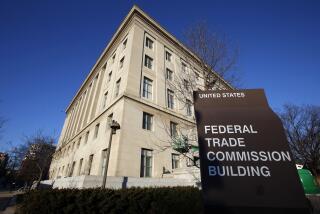Single-Stock Futures Trading Ban May End
- Share via
Get ready for more “derivative” securities.
U.S. regulators and legislators said Monday that they want to end a two-decade ban on trading futures contracts based on individual stocks, allowing domestic exchanges to better compete for customers with foreign derivatives markets.
Regulators have agreed on a way of policing trades and are discussing whether several exchanges should be allowed to offer the single-stock futures, Securities and Exchange Commission Chairman Arthur Levitt said.
Senate Banking Committee Chairman Phil Gramm (R-Texas) said he will co-sponsor legislation to end the ban.
Futures exchanges see stock futures as a way to slow the erosion of their share of derivatives trading. It also could help them compete with stock options and with some overseas markets, from Hong Kong to Sydney to Helsinki, where futures on foreign stocks are offered.
“The ban on single-stock futures and futures on narrow-based stock indexes should be lifted,” Levitt told the Senate Banking Committee at a field hearing in Chicago. “But it is critical that the introduction of these products be accompanied by the regulatory safeguards.”
While regulators and legislators support lifting the ban, they want to make sure rules on trading will help avoid potential disruptions on other markets and discourage fraud, which were the reasons for the initial ban.
Unlike options, futures on stocks are contracts requiring the holder to buy or sell the security at a specified future date and price, though such contracts probably would be settled in cash based on the stock price.
An option, by contrast, provides the right, but not the obligation, to buy or sell at a specific price.
Exchanges in at least eight countries trade futures on single stocks such as Volvo, Nokia and Pharmacia & Upjohn, according to Chicago Board of Trade spokesman Brett Galloway.
More to Read
Inside the business of entertainment
The Wide Shot brings you news, analysis and insights on everything from streaming wars to production — and what it all means for the future.
You may occasionally receive promotional content from the Los Angeles Times.










